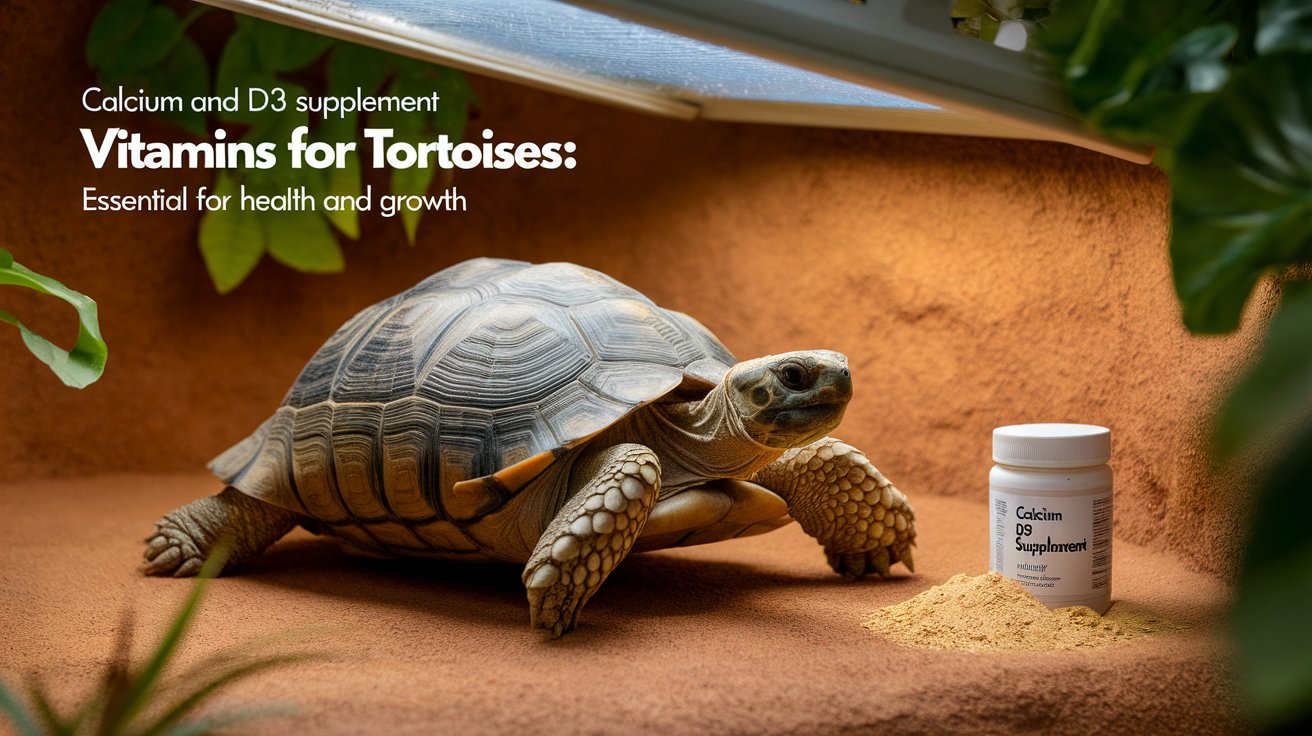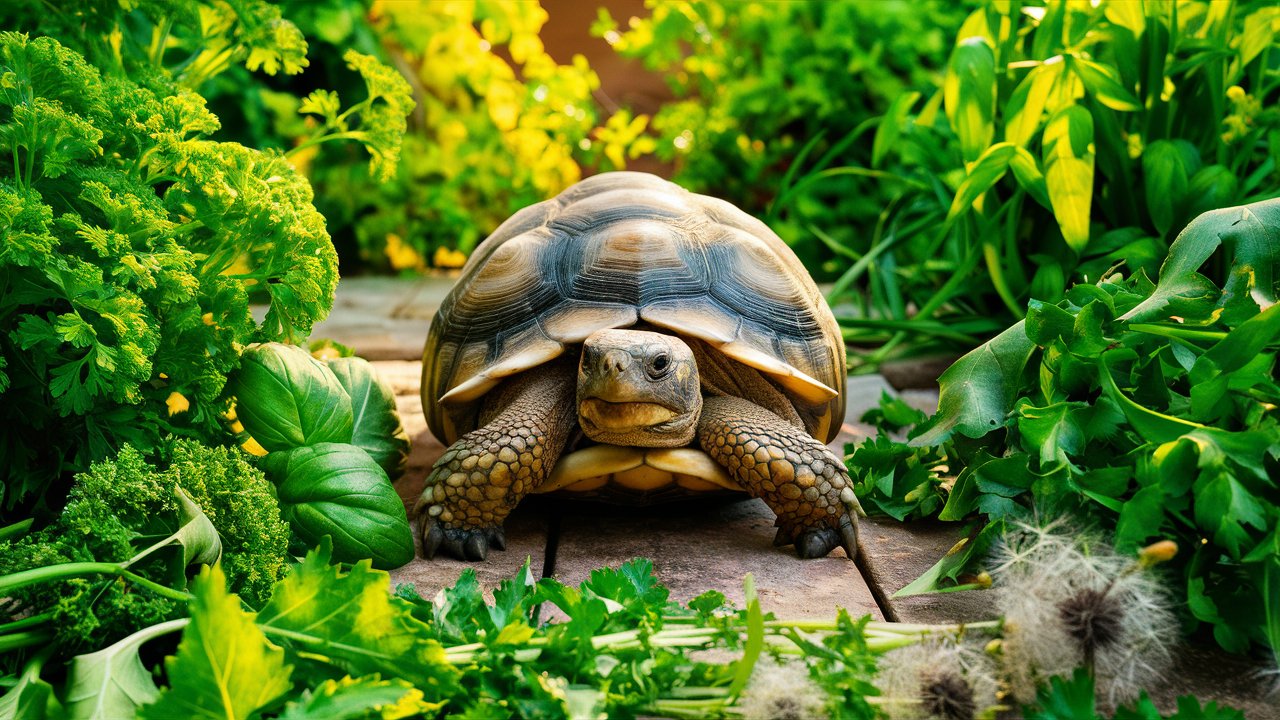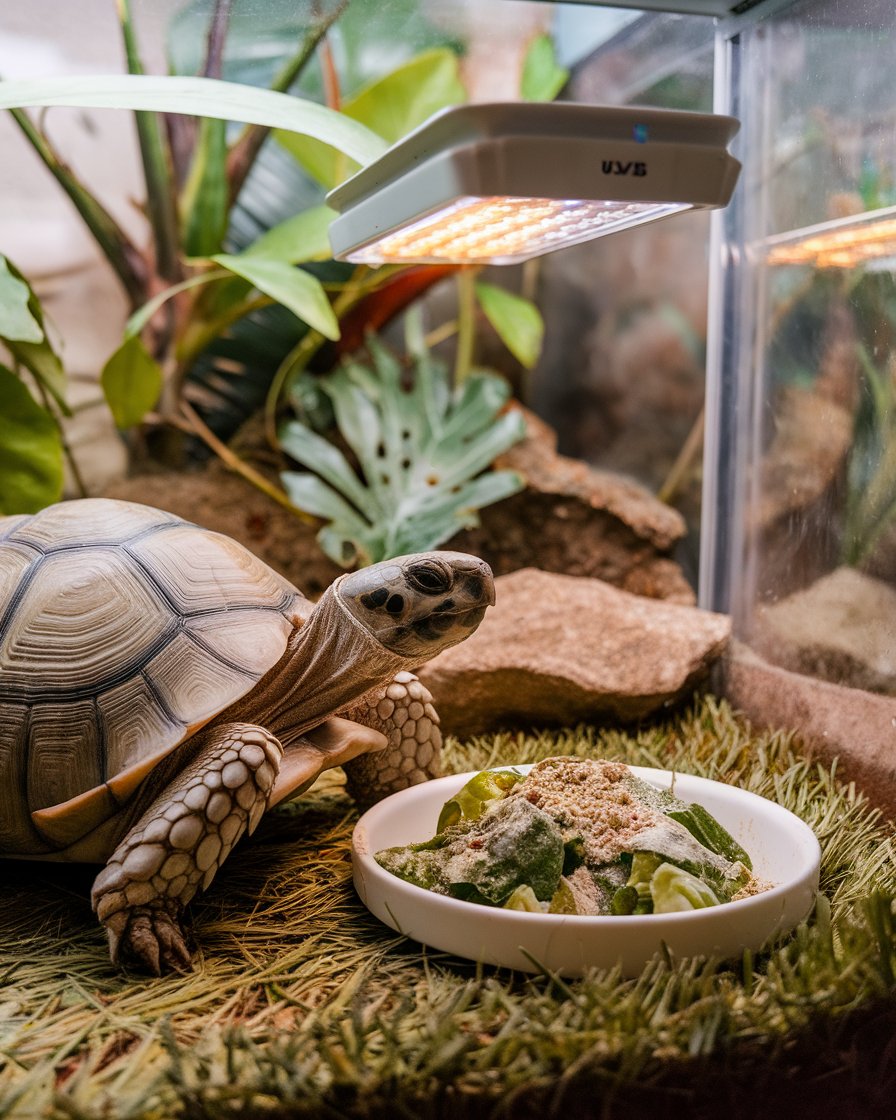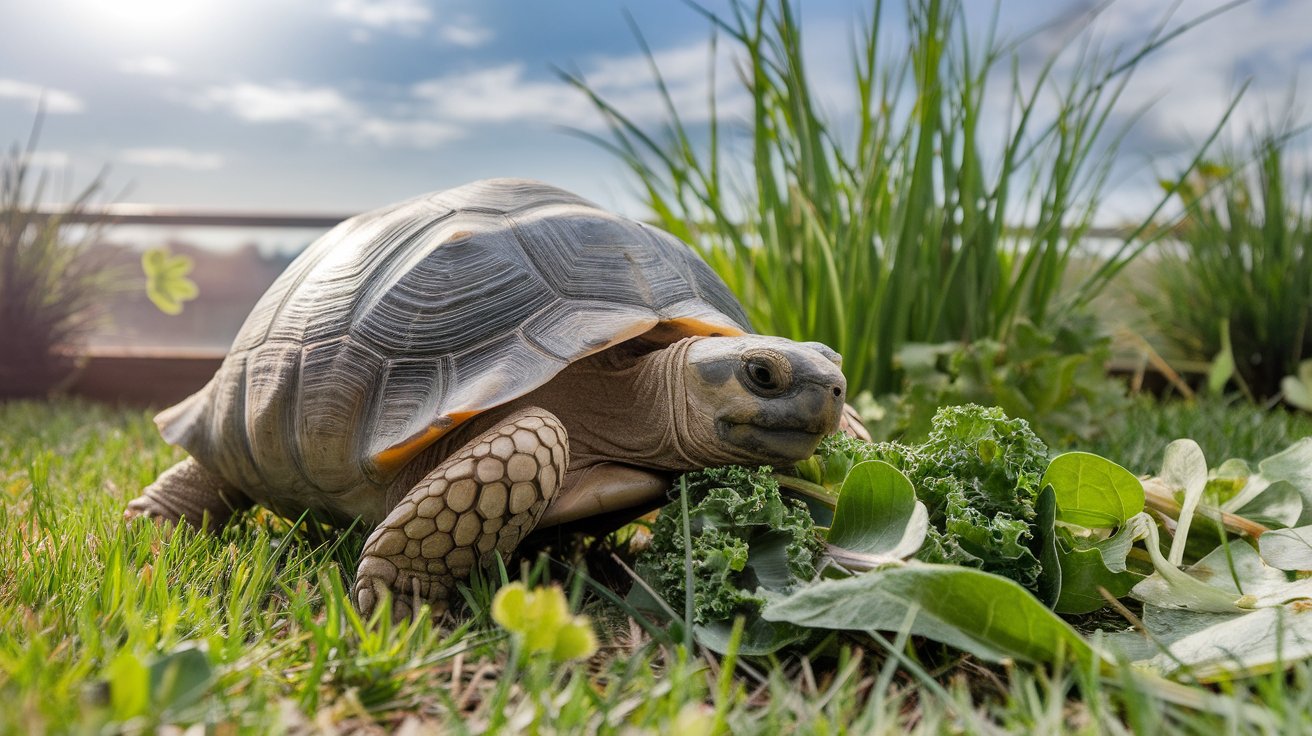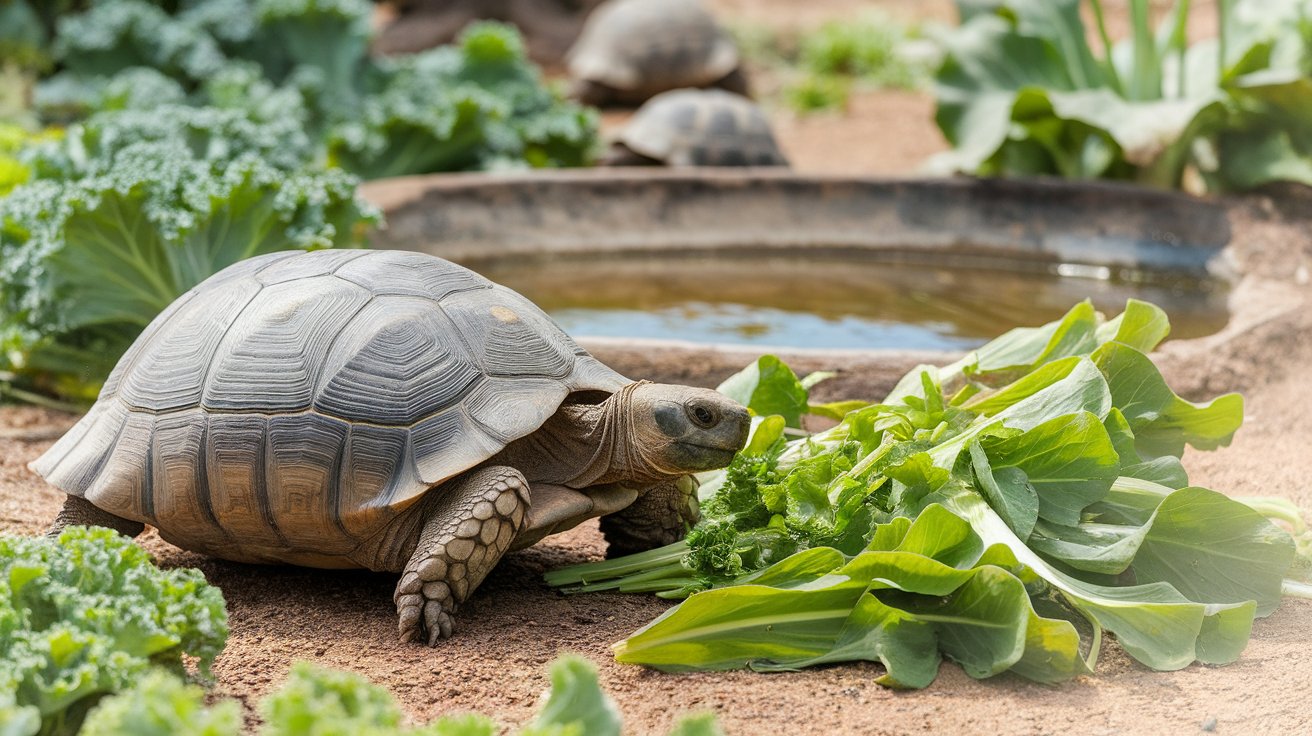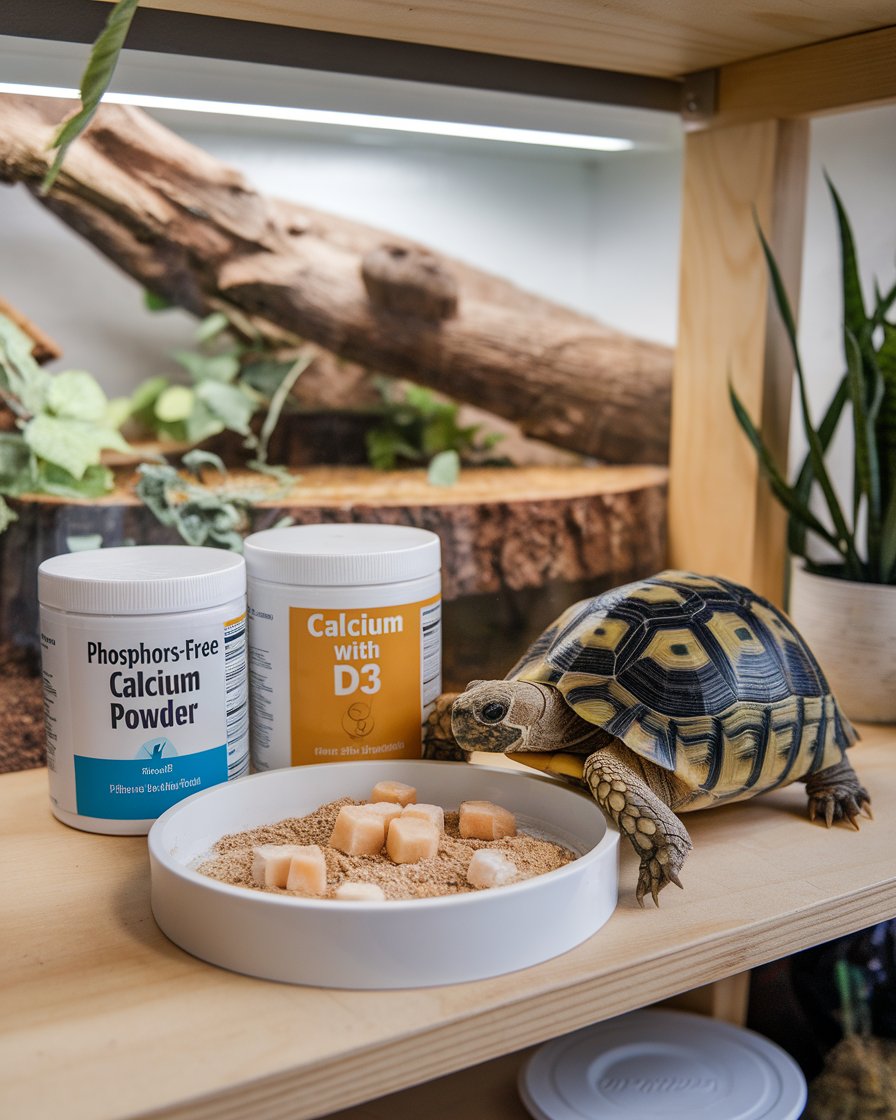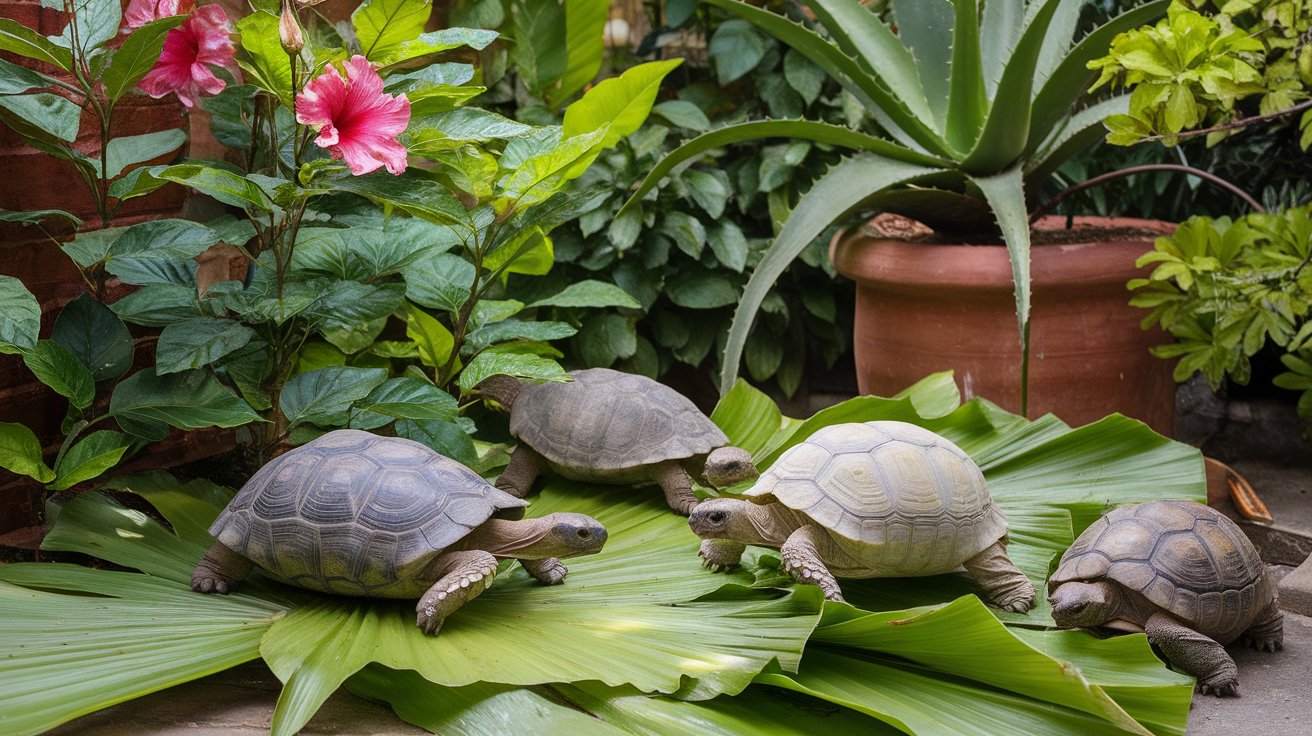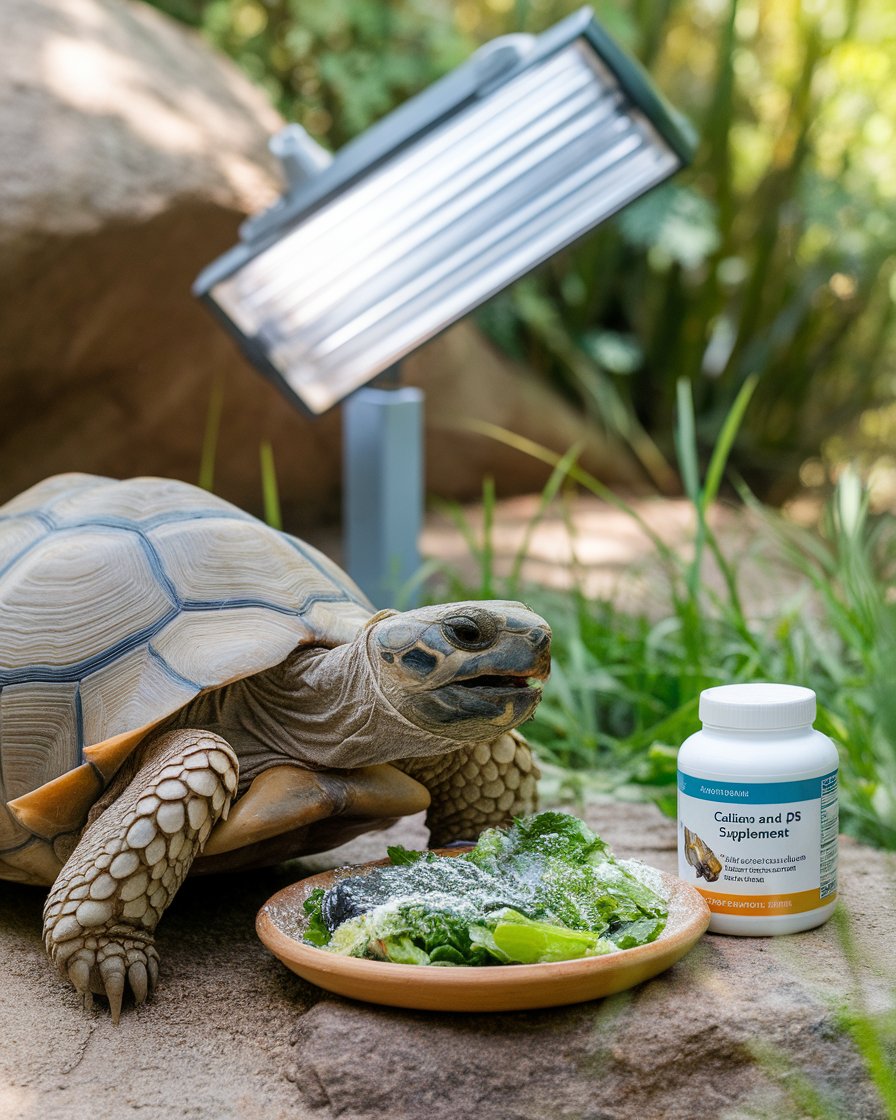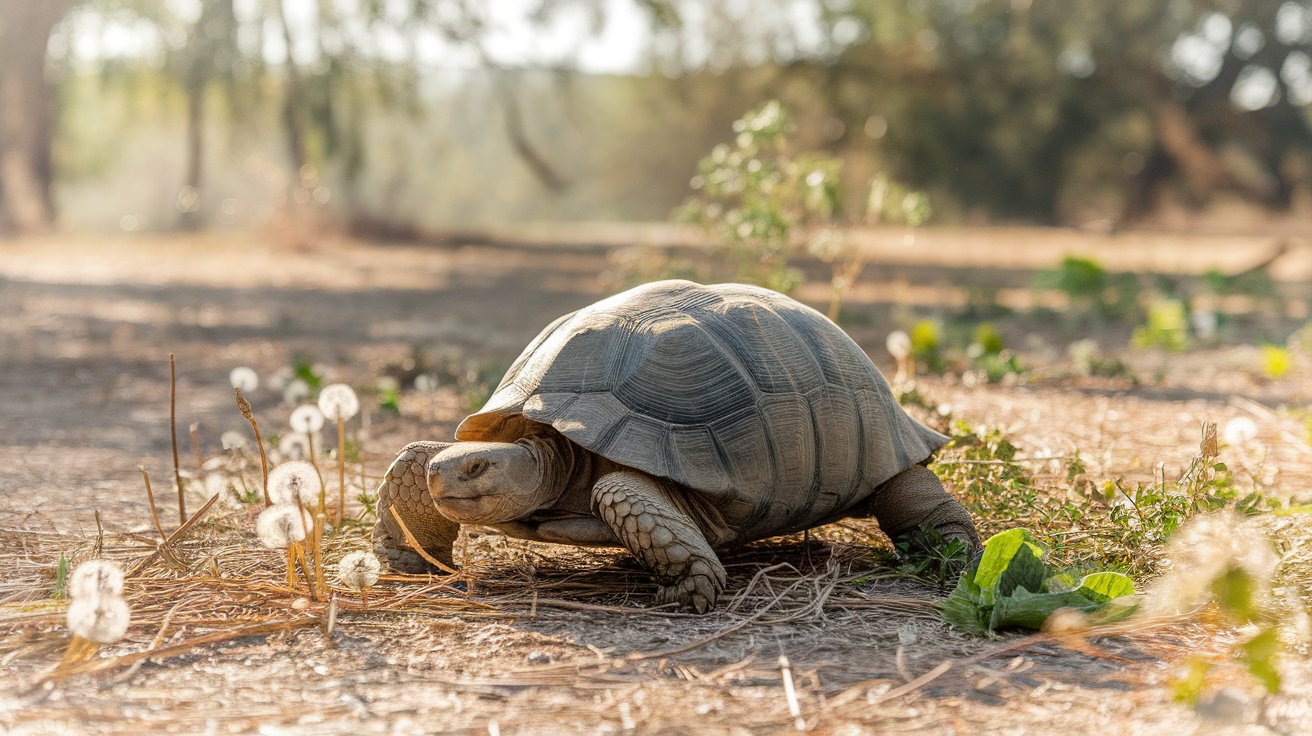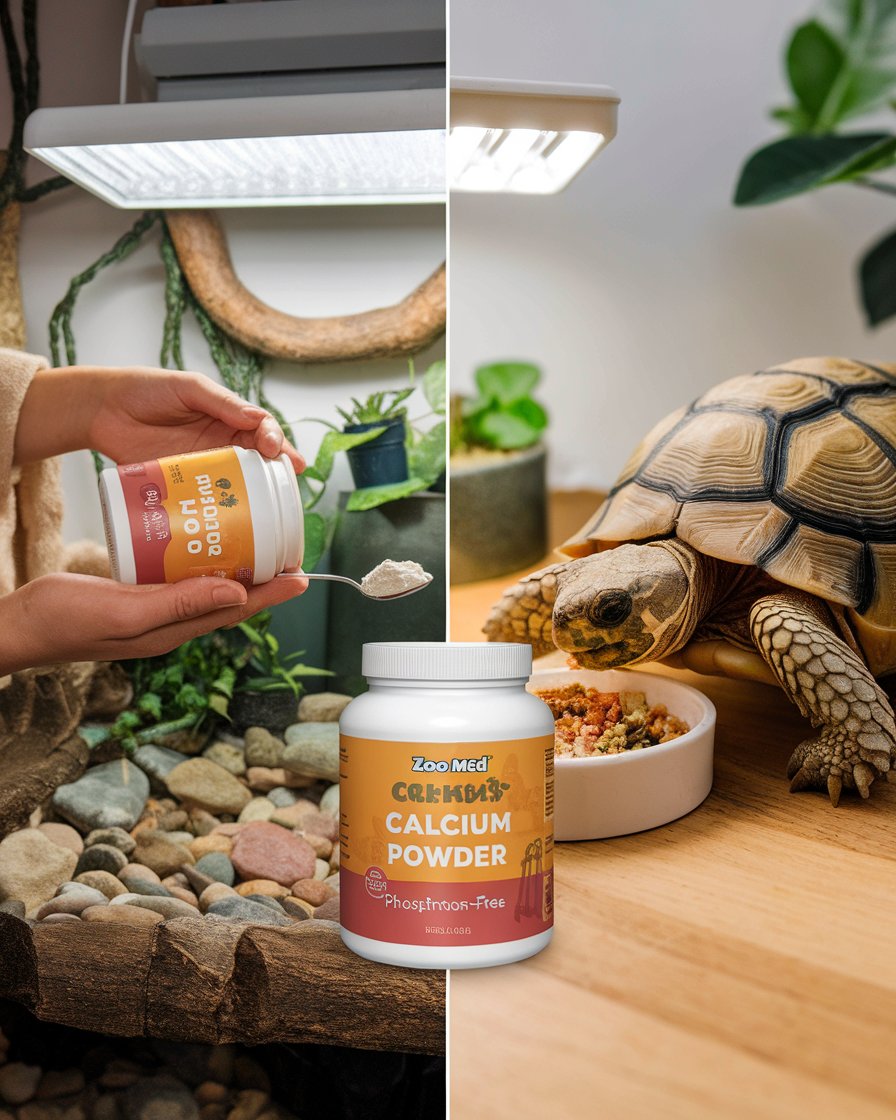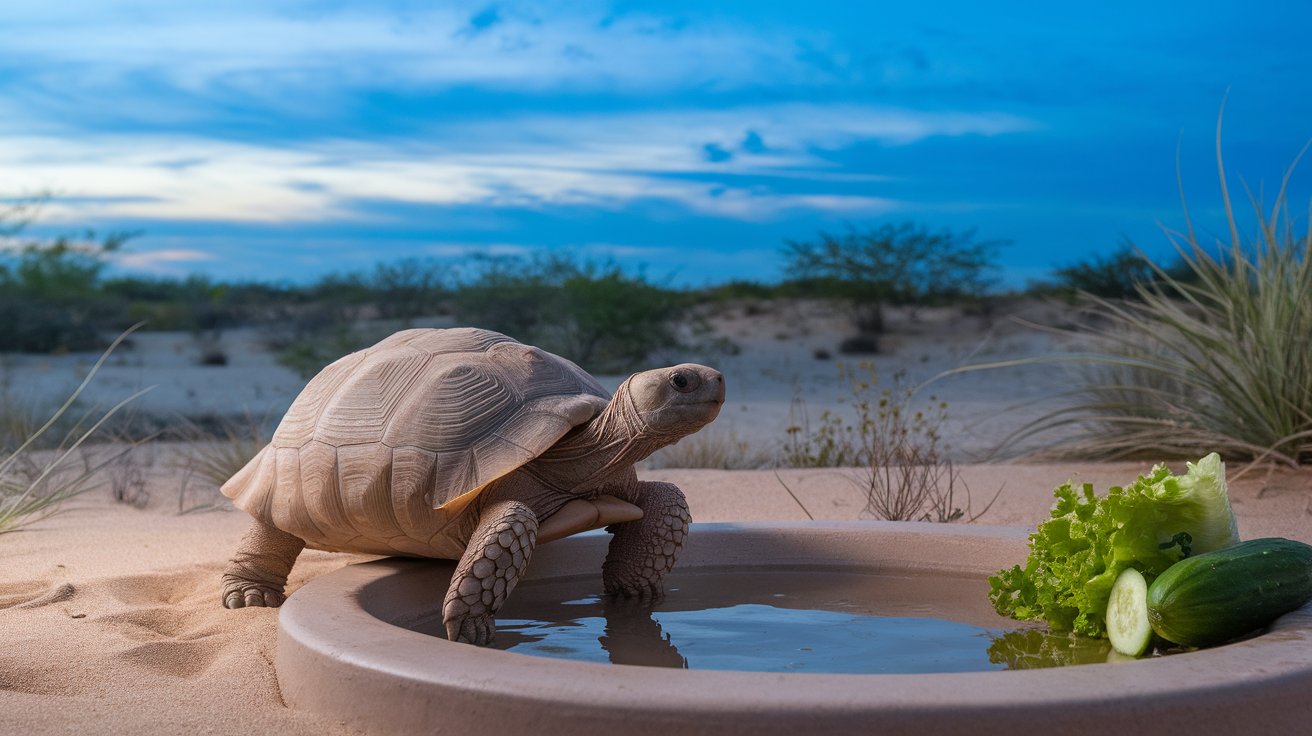Introduction
When caring for a tortoise, providing proper calcium and Vitamin D3 supplementation is crucial for maintaining their health. These vitamins and minerals are essential for ensuring strong bones and a healthy shell. Without enough calcium, tortoises may develop metabolic bone disease, leading to shell deformities or brittle bones. Vitamin D3 aids in calcium absorption, particularly for tortoises living indoors or in areas with limited sunlight. Incorporating a calcium and D3 supplement into your tortoise’s diet can prevent these issues and promote overall vitality.
Using a high-quality calcium carbonate supplement, like those found in pet stores, helps support your tortoise’s digestive system and ensures healthy bone development. Products like Zoo Med and Rep-Cal are popular choices due to their effectiveness. These ultra-fine calcium powders are easy to sprinkle onto your tortoise’s food, ensuring they receive the necessary nutrients to thrive. Regular calcium supplementation, paired with proper UV exposure, helps maintain the tortoise’s overall well-being, especially in controlled environments like vivariums.
Key Takeaways
Calcium and Vitamin D3 are essential for strong bones and preventing metabolic bone disease in tortoises.
Vitamin D3 helps tortoises absorb calcium efficiently, especially for those living indoors with limited UV exposure.
Choosing a phosphorus-free calcium supplement is critical for maintaining the right calcium-to-phosphorus balance in tortoises.
Calcium carbonate supplements, like Zoo Med and Rep-Cal, are easy to sprinkle onto tortoise food for consistent nutrient intake.
UVB light exposure is crucial for tortoises to synthesize Vitamin D3, aiding in calcium absorption and overall health.
Over-supplementation of calcium should be avoided to prevent health issues like hypercalcemia in tortoises.
Why Calcium and Vitamin D3 are Essential Supplements for Your Tortoise
Calcium and Vitamin D3 are crucial for the overall health of tortoises, as they play a vital role in bone development and metabolic processes. Without adequate calcium, your tortoise’s shell and skeletal system may become brittle, leading to serious health issues like pyramiding. Vitamin D3, often synthesized through exposure to UV light, helps tortoises absorb calcium more efficiently. For tortoises that live indoors or in areas with limited sunlight, calcium and Vitamin D3 supplements are essential. Adding a calcium supplement to your tortoise’s diet twice a week, alongside their regular food, helps ensure healthy bone development and prevents deficiencies.
Key Benefits of Calcium and Vitamin D3 for Tortoises
1. Supports Strong Shell and Bone Development
Calcium is essential for the overall growth and strength of a tortoise’s shell and bones. Without it, your tortoise can develop brittle bones and other health issues, like pyramiding. Adding calcium carbonate supplements ensures your tortoise’s skeletal system remains strong, reducing the risk of deformities or bone-related illnesses.
2. Enhances Calcium Absorption with Vitamin D3
Vitamin D3 plays a critical role in how well tortoises absorb calcium. Tortoises that are exposed to UV light naturally synthesize Vitamin D3, but indoor tortoises or those living in areas with little sunlight often need a calcium and D3 supplement. This helps maximize the benefits of the calcium in their diet, promoting better overall health.
3. Prevents Metabolic Bone Disease
One of the most serious risks of calcium deficiency in tortoises is metabolic bone disease. This condition weakens the bones and shell, leaving tortoises vulnerable to fractures and other complications. Regularly adding calcium with D3 to their food helps to prevent this disease, especially in young or growing tortoises.
4. Maintains Balanced Nutrition in Captive Tortoises
In captivity, tortoises may not always have access to the same variety of nutrients found in their natural habitats. A balanced tortoise diet that includes calcium supplementation can fill this gap, ensuring they receive all the essential vitamins and minerals necessary for growth and vitality. Herbivorous tortoises, in particular, benefit from a carefully regulated diet.
5. Promotes Healthy Growth in Hatchlings
Hatchling tortoises have a high demand for calcium as they rapidly grow. Without enough calcium supplements, their shells may not form correctly, and their bones could weaken. Adding calcium to their food ensures they grow into healthy adults with strong skeletal structures, supporting their long-term development.
6. Improves the Effectiveness of UVB Light
If your tortoise spends a lot of time indoors, ensuring they get enough UVB light is crucial. UVB exposure helps the body produce Vitamin D3, which is necessary for calcium absorption. A reptile light can simulate sunlight, but pairing it with calcium and D3 supplements ensures that your tortoise’s body is efficiently processing the calcium it receives.
The Role of Calcium in Tortoise Shell and Bone Health
Calcium is essential for maintaining strong bones and a healthy shell in tortoises. A deficiency can lead to serious health problems like shell deformities and brittle bones. Calcium supplements help fortify the tortoise’s skeletal system, supporting its overall growth and vitality. Tortoises may also face metabolic bone disease if their calcium levels are too low, making calcium supplementation vital. By adding calcium supplements, such as calcium carbonate, to their diet, tortoise keepers can prevent these issues, ensuring their pet thrives in both indoor and outdoor environments.
How Vitamin D3 Aids in Calcium Absorption for Tortoises
Vitamin D3 plays a key role in helping tortoises absorb calcium effectively. Without adequate Vitamin D3, even the best calcium supplements won’t be fully utilized by the body, which could lead to health complications. Tortoises naturally synthesize Vitamin D3 when exposed to UV light, but those living indoors often lack sufficient sunlight. In such cases, calcium supplements containing Vitamin D3, like Zoo Med’s reptile calcium powder, become a crucial part of a balanced diet. Providing both UVB light and D3 supplements ensures that calcium is properly absorbed, leading to strong bones and overall better health for your tortoise.
Choosing the Right Calcium Supplement for Your Tortoise’s Diet
When selecting a calcium supplement for your tortoise, it’s important to consider the calcium-to-phosphorus ratio. Tortoises require a supplement low in phosphorus to avoid imbalances that could harm their health. Many pet owners prefer calcium carbonate-based supplements, such as those offered by Zoo Med. These supplements are available in both powder and cuttlebone forms, which can be easily added to tortoise food. Whether you’re fortifying a herbivorous tortoise’s diet or supporting laying females, choosing a high-quality, phosphorus-free calcium supplement is critical to maintaining your pet’s long-term health.
Case Study: Success with Phosphorus-Free Calcium Supplements in Tortoises
In 2021, a tortoise rescue organization in the UK conducted a study on the effects of calcium supplements in herbivorous tortoises. The study focused on tortoises that were showing early signs of calcium deficiency, such as soft shells and weak bones. The organization chose to switch these tortoises to a phosphorus-free calcium carbonate supplement from Zoo Med, paired with UVB light exposure to ensure proper Vitamin D3 synthesis.
Over the course of six months, the rescue team monitored the tortoises’ health and tracked the improvement of their shell strength. The results were clear: 85% of the tortoises showed significant improvement in their bone density and shell hardness, particularly in young and growing tortoises. The success was attributed to the phosphorus-free formulation, which prevented any disruption in calcium absorption, and the consistent calcium supplementation twice a week. This case demonstrates how choosing the right calcium supplement can make a significant impact on a tortoise’s long-term health.
Phosphorus-Free Calcium Supplements for Optimal Tortoise Health
For tortoises, maintaining the correct calcium-to-phosphorus ratio is critical. Phosphorus can interfere with calcium absorption, which is why many pet owners opt for phosphorus-free calcium supplements. Zoo Med’s calcium powder is a popular choice because it contains no phosphorus, making it a safe option for tortoises that need a high-calcium, low-phosphorus diet. A supplement that offers a pure form of calcium without added phosphorus helps keep your tortoise’s diet balanced and promotes healthy bone development.
Using Calcium Carbonate in Tortoise Food for Consistent Nutrient Intake
Calcium carbonate is a widely used form of calcium for tortoises because it is easy to digest and absorb. This form of calcium can be found in products like cuttlebone or powdered supplements, which are easily sprinkled onto a tortoise’s food. Whether your tortoise consumes fresh greens or formulated pellets, adding calcium carbonate ensures they receive the calcium they need to maintain strong bones and a healthy shell. Zoo Med’s calcium supplements offer this in an ultra-fine powder, making it simple to incorporate into any meal.
How to Properly Incorporate Calcium and Vitamin D3 into Your Tortoise’s Food
Incorporating calcium and Vitamin D3 into your tortoise’s diet requires more than simply sprinkling powder onto food. The supplement should be used regularly but in moderation—usually twice a week—to avoid excessive calcium levels. Additionally, pairing the calcium with proper UV light exposure ensures Vitamin D3 synthesis, which is crucial for calcium absorption. Calcium supplementation can be applied to fresh vegetables or formulated pellets in your tortoise’s food. It’s important to use a supplement that contains Vitamin D3 if your tortoise doesn’t have consistent access to natural sunlight, especially for indoor reptiles.
Balancing Calcium Supplements with UVB Light Exposure
Incorporating calcium into your tortoise’s diet goes hand in hand with providing adequate UVB light exposure. UVB light allows your tortoise to produce Vitamin D3, which is crucial for calcium absorption. Without it, the calcium supplement you provide may not be as effective. If your tortoise lives indoors or in areas with minimal sunlight, consider using UVB bulbs in their habitat. Pairing a calcium supplement that includes Vitamin D3 with consistent UVB light exposure creates an ideal environment for your tortoise’s health, ensuring their bones stay strong and their body functions properly.
Avoiding Over-Supplementation: When to Use Calcium Sparingly
While calcium is essential for your tortoise’s health, over-supplementation can lead to issues such as hypercalcemia, where excess calcium causes more harm than good. It’s important to use calcium and Vitamin D3 supplements in moderation—typically twice a week—rather than every day. Monitor your tortoise’s calcium intake closely, especially if you are also providing calcium-rich foods like dandelions or fortified pellets. Overloading their diet with calcium can disrupt their metabolic balance, so make sure to follow guidelines on appropriate supplementation for optimal health.
“Calcium metabolism is essential for all reptiles, and without the proper balance of calcium, Vitamin D3, and UVB light, a tortoise’s health can quickly deteriorate.” – Dr. Douglas Mader
Zoo Med Calcium Supplements: A Look at Customer Reviews and Phosphorus Levels
Zoo Med’s calcium supplements have garnered positive customer reviews, particularly for their high calcium content and low phosphorus levels. Many reptile keepers recommend Zoo Med products because they are phosphorus-free, which is ideal for tortoises that require a precise balance of calcium and phosphorus in their diet. The calcium powder is fine and easy to sprinkle onto tortoise food, ensuring even distribution and absorption. For herbivorous tortoises, maintaining the right calcium levels is essential for avoiding conditions like pyramiding. Customer reviews also highlight the effectiveness of Zoo Med supplements in supporting healthy bone development in captive tortoises.
Customer Reviews: Why Zoo Med Calcium is a Trusted Choice for Tortoises
Zoo Med’s calcium supplements receive consistent praise in customer reviews for their high-quality ingredients and effectiveness in supporting tortoise health. Pet owners appreciate the phosphorus-free formula, which is ideal for preventing imbalances in the calcium-to-phosphorus ratio. Many customers also report that the fine powder makes it easy to mix with tortoise food, ensuring even distribution. Reviews highlight how Zoo Med calcium supplements, especially those with added Vitamin D3, have helped their tortoises maintain strong bones and a healthy shell, especially for those living in indoor environments.
The Importance of Phosphorus Levels in Reptile Calcium Supplements
Phosphorus is a mineral that, in excess, can hinder calcium absorption in tortoises, leading to health problems. That’s why choosing a calcium supplement with low or no phosphorus content, like those offered by Zoo Med, is vital for your tortoise’s well-being. These supplements are designed to meet the specific needs of reptiles, helping them achieve the right balance of calcium and phosphorus. For tortoises, especially those kept indoors or on prepared diets, a phosphorus-free supplement ensures their nutritional needs are met without compromising their health.
Conclusion
Making sure your tortoise gets the right calcium and Vitamin D3 supplements is a big deal for their overall health. Tortoises, especially those living indoors or in a spot with limited sunlight, need calcium with D3 to keep their bones strong and prevent things like metabolic bone disease. You can easily find calcium supplements in pet stores, such as ultra-fine calcium powders, that are perfect for sprinkling on your tortoise’s food. This makes sure they get the right nutrients to stay healthy and keep their shell strong. Don’t forget regular vitamin supplements play a huge role in keeping your tortoise’s bones and overall body in check.
Along with giving them the right mineral supplements, like cuttlefish or limestone powder, setting up a UVB reptile light and a warm basking area helps your tortoise make enough Vitamin D3 to properly absorb the calcium. Whether you’re caring for a hatchling, herbivore, or even an exotic pet, balancing calcium with other nutrients like magnesium and keeping an eye on phosphorus is key. With the right setup, your tortoise will live a healthy, happy life, no matter where they’re from!

